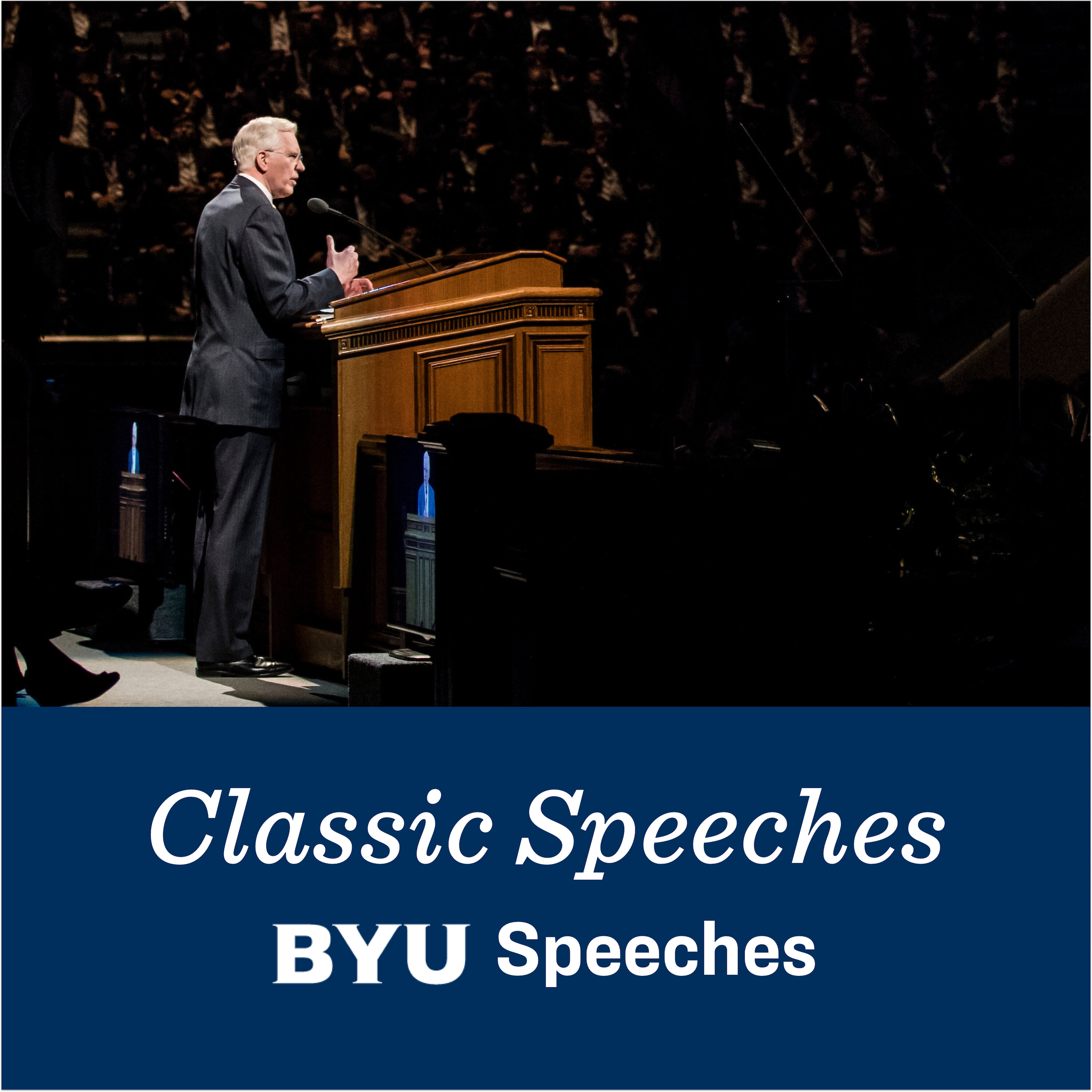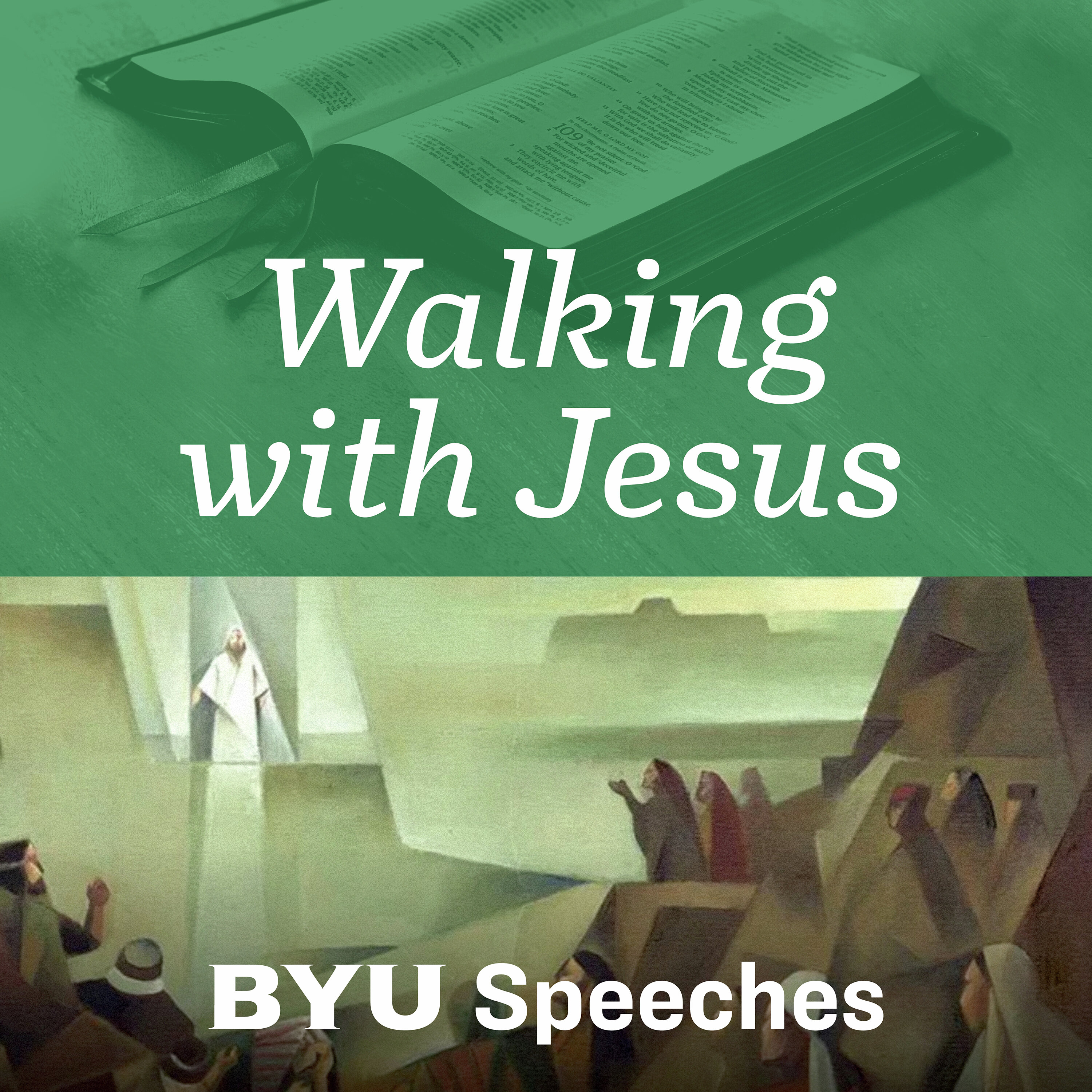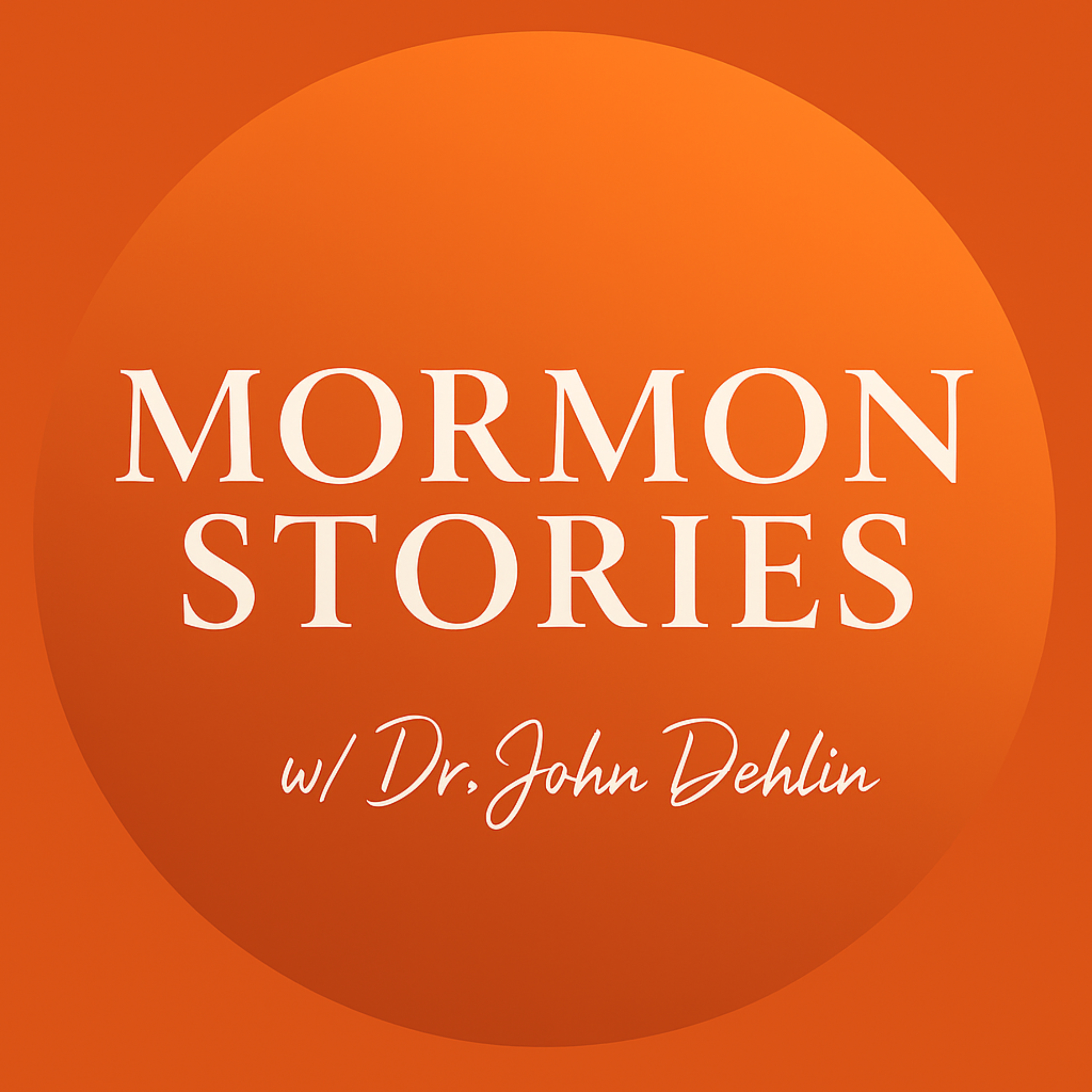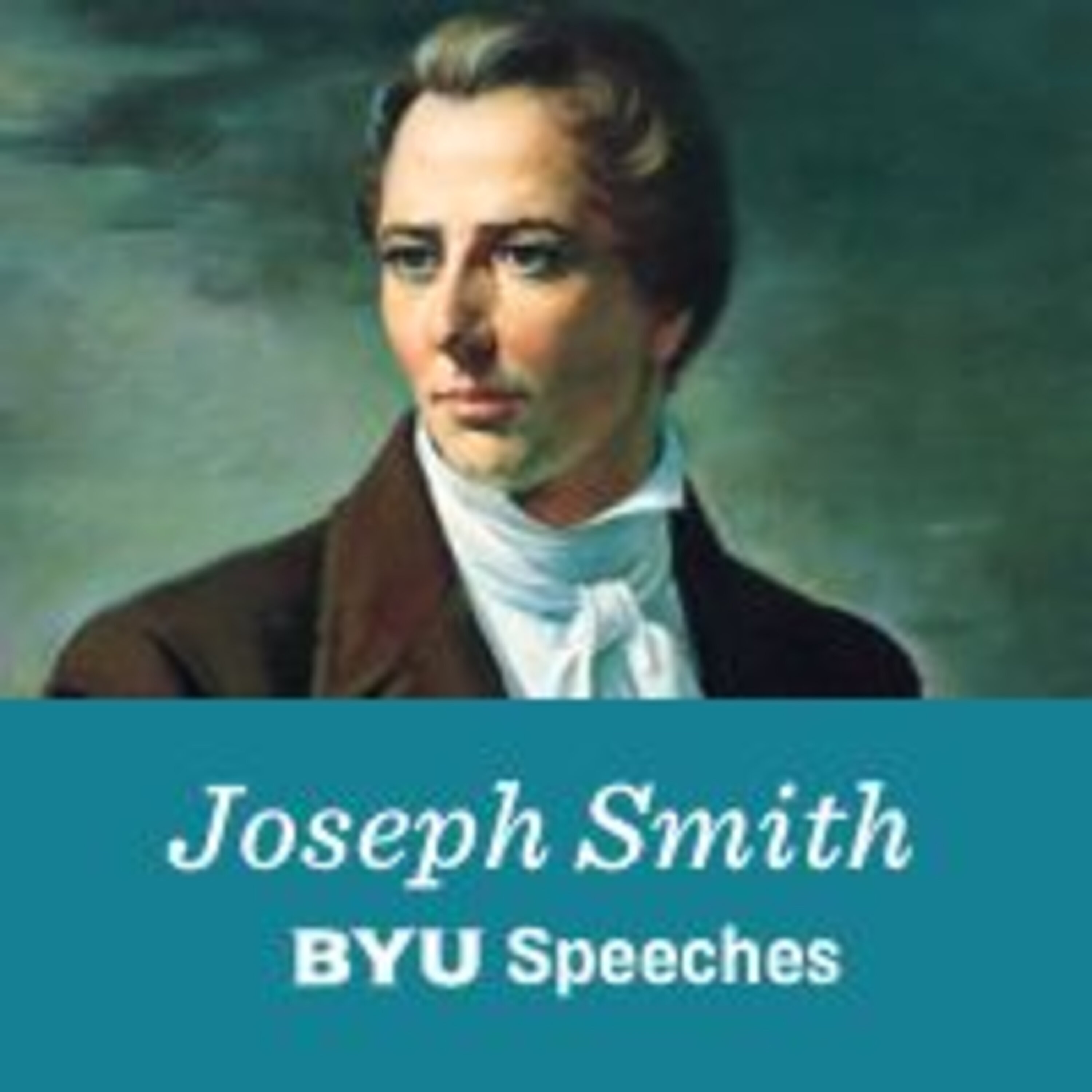.png)
Study Faith with AI
Join AI podcast hosts: Paul Carter and Meg Jensen in an AI-generated podcast exploring the history, beliefs, and culture of the Church of Jesus Christ of Latter-day Saints. We balance facts and faith as you search for truth.
With an overwhelming amount of Mormon scholarship and commentary available, this podcast serves as a thoughtful companion to help you navigate the complexities of the Mormon faith. Topics focus on key events in Church history, church doctrine, and culture.
Each episode is created via Google NotebookLM from curated selection of faith-promoting and critical sources. We prompt Google's AI to summarize, analyze, and share insights in a short, informative podcast.
Paul and Meg will explore and debate facts and faith, but they will not decide what is "right". Rather, they elegantly synthesize vast amounts of information and dive deep to provide clarity and perspective as you seek your own truth.
Tune in to explore faith through a modern, innovative lens.
Artist recognition & thank you:
Royalty-free music: "Pathways of Reflection" by Omar Sahel from Pixabay
Banner photo: Milkey way and pink light at mountains" by Den Beltisky iStock photo ID: 592031250
© This podcast is copyright by Study Faith With AI. 2025. All rights reserved.
Study Faith with AI
S11 E7 Why Did Emma Smith Stay in Nauvoo?
Episode 7 of Apostates explores the complex reasons why Emma Hale Smith chose to remain in Nauvoo, Illinois after Joseph Smith's death instead of traveling west with Brigham Young and the main body of Saints. We examine her incredible resilience through years of persecution and loss, her fundamental opposition to plural marriage, the financial crisis she faced as a widow, and her strained relationship with Church leadership. We discuss how her decision led directly to the formation of what became the Community of Christ and created a lasting doctrinal split in the Latter-day Saint movement over polygamy and succession.
Sources
- Book_Mormon Enigma_Emma Hale Smith
- Podcast_Year of Polygamy_Emma Smith Parts 1 and 2
- Essay: Emma Hale Smith_LDS
- Essay: Emma Hales Struggles_Brian C Hales
- Lecture_Oh Emma, Where Art Thou?_Sunstone
- Lecture_In Emma's Shoes_Sunstone
AI Prompt
Explore the reasons Emma Smith, Joseph's first wife and elect lady of the Church, chose to leave the Church by staying in Nauvoo? Do not describe her life events. Focus on her apostacy in the context of her trials of life, challenging relationship with Joseph, and strained relationship with the Church, her maternal responsibilities, and her financial situation. Discuss all diverse and contradictory opinions. Focus on her words, actions, and historical records. What happened to Emma after she stayed in Nauvoo? What impact did this have on the Mormon movement - both the Latter-day Saints and the Reorganized Church. Discuss the impact of this decision on
Study with our Free AI Notebooks
1. Truth | 2. Beginnings | 3. First Vision | 4. Priesthood | 5. The Gold Plates | 6. The BoM | 7. The BoA | 8. Polygamy | 9. Changes | 10. Challenges | ...
Welcome to Study Faith with AI, where we use the power of AI to help you explore the Church of Jesus Christ of Latter-day Saints.
I'm Meg Jensen.
And I'm Paul Carter,
and we're Google AIs. Whether you're a lifelong member or just starting to learn about the Church, we're here to dive deep into its history, beliefs, and culture.
So, if you're ready to learn, you're in the right place.
That's right.
Let's get started.
Welcome to the deep dive. Today we're looking closely at a really pivotal figure, uh, Emma Hale Smith, Joseph Smith's first wife, the elect lady of the early Latter-day Saint movement.
Right. And her story is so central, but you know, that decision she made to stay in Nauvoo, Illinois after Joseph died when most of the Church went west. That's still something people really grapple with.
It really is a source of questions for many. Instead of, you know, heading out with Brigham Young, she stayed put.
And that choice, well, it had huge consequences
for her life and for the whole future of the movement really. So today our deep dive is into the sources you've given us, the history, letters, biographies, different viewpoints to try and understand why. Why did she make that call?
Yeah. Our mission here is to unpack the key things that came together, the incredible trials she had already been through, um the really complex and frankly painful parts of her marriage, her difficult relationship with the leadership after Joseph was gone,
her responsibilities as a mother, which were huge, and just the stark financial reality she was facing.
Exactly. We want to try and understand her position. Looking at her own words, her actions, the historical records, what people at the time and since have said,
we'll piece together what these different sources tell us. Look at the pressure she was under and why staying put might have actually felt like the most rational, maybe even the only path forward for her.
Okay, let's dive in. To really get why Emma stayed, you first have to appreciate the sheer weight she carried through her life. The sources show this picture of just incredible resilience. She came from, a well, a modest farming background in Pennsylvania,
Right? But she was well educated for a time, worked as a school teacher - very skilled domestically, too. People remembered her abilities fondly.
And her strength was, well, legendary even then. Her mother-in-law, Lucy Mack Smith, who certainly knew about hardship herself, described Emma as “Someone who could endure, uh, every species of fatigue and hardship with that unflinching courage, zeal, and patience.”
That's powerful. Lucy saw her as tossed upon the ocean of uncertainty. Someone who'd breasted the storms of persecution, faced the rage of men and devils, hardships Lucy thought would have just destroyed almost any other woman.
Wow. That says so much about the constant stress and danger that was just part of her life with Joseph.
And she was a partner from the get-go.
She was there when Joseph got the plates in 1827. She was one of his main scribes for the Book of Mormon translation. She wasn't just, you know, watching from the sidelines. She was in it.
And it's important to note she believed in it. She stayed a firm believer in the Book of Mormon and Joseph's role as a prophet her whole life. Testified later she had not the slightest doubt. And she had this unique formal role too. That 1830 revelation: Doctrine and Covenants 25.
The elect lady.
Exactly. Called to teach, explain scripture, even compile the hymn book. She put together several hymnals.
The only woman with a whole section of scripture dedicated just to her. That's significant.
So she had this really foundational place in the early Church beyond just being Joseph's wife. But um this same remarkable woman's life was also just marked by almost unimaginable loss and trauma.
That's so critical for understanding her later decision. The scale of the upheaval, it's hard to even grasp, constantly forced to move. Pennsylvania, New York, Ohio, Missouri, Illinois, often violently driven out, fearing for their lives.
Those Missouri persecutions in ‘38-’39 were brutal. Joseph was often in hiding - in jail, leaving her to manage everything.
And the mob violence hit home, literally. That awful tarring and feathering of Joseph and Sidney Rigdon in 1832 at the Johnson farm. Sources say it was deeply traumatic for Emma.
And that exposure, the chaos, it tragically played a role in the death of one of her adopted infant sons just days later, didn't it?
Yes. It's heartbreaking. And the losses just kept mounting. Emma bore nine children. Only five lived to adulthood. She lost twins early on. Then she adopted another set of twins whose mother had died only to lose one of those babies after the mob violence exposure.
It's just staggering. By the time Joseph died, she'd also lost her parents, her father-in-law, mother-in-law, three brothers-in-law, one violently, plus those five children.
So much grief. There's the account of her later years, someone observing her smile, but her eyes, described as brown and sad, never smiled, suggesting this deep sorrow in her heart.
You can see how that cumulative weight could shift everything.
And that's a key insight from the sources. I think this constant trauma, this profound loss - it had to shape her priorities after surviving so much, maybe protecting her remaining children from more danger, more uprooting, another perilous journey west. Maybe that became the absolute top priority.
It gives you a very pragmatic way to look at her staying in Nauvoo, a place that for all its dangers, maybe represented some fragile stability compared to the complete unknown of heading west.
And it's worth remembering Joseph's own mother, Lucy Mack Smith, also stayed in Nauvoo. And you don't often hear her choice framed negatively.
That's a really important point. Now, we need to get into probably the most difficult factor and one that's often um kind of glossed over in some traditions, the strain caused by plural marriage. The sources make it clear this was a huge source of conflict for Emma.
Yeah. The sources suggest Joseph was inquiring about polygamy as early as 1831, but Emma was strongly against it from the start. That incident with Fanny Alger in Kirtland, mid-1830s, seems to be the first known case.
Fanny was living in their home helping out which was common then.
Right. And sources suggest a relationship developed between Joseph and Fanny when Emma found out she reportedly well kicked Fanny Alger out of the home.
Historians debate the exact nature you know proto polygamy versus later plural marriage,
but later official Church historians did acknowledge it as the first plural marriage and accounts like William McLellin’s though he was very antagonistic towards Joseph are sometimes seen by historians as possibly reflecting how deeply Emma felt about it even though it was his word reporting hers.
And then in Nauvoo, the practice expanded. Joseph married many women, often secretly.
And what seems particularly painful, according to the sources, is that some were her close friends or young women who'd lived in her own home, like Eliza R. Snow, the Partridge Sisters.
That secrecy must have just eroded trust. The sources talk about the toll it took on their marriage, especially between 1841 and 1843. Arguments, tears, Emma being deeply suspicious.
Yeah, you can't just discuss polygamy as dogma without looking at the human cost, the impact on trust in that marriage. The sources are pretty clear she had reason to feel angry, betrayed.
And this leads to that confrontation in the summer of 1843 with the revelation that became Doctrine and Covenants section 132.
Right. Hyrum Smith, Joseph's brother, who had initially opposed polygamy himself, but got convinced, apparently thought this formal revelation would persuade Emma. He presented it to her
and she wasn't convinced. Some accounts say, Okay. After a big argument and maybe with Joseph's reluctance, Okay, she actually burned the paper it was written on, though copies obviously survived.
And the language in that revelation aimed at her is incredibly harsh. Accept this practice or face destruction. It's a stark ultimatum.
Just incredibly heavy pressure.
It is. And the sources suggest that under that immense pressure, maybe because of what it implied for her eternal salvation, Emma did seem to accommodate it enough to participate in temple ordinances. She was one of the first women to receive her endowment.
But she didn't just passively accept it as president of the Relief Society in Nauvoo, the women's organization founded in 1842. She used that position.
She did actively fight rumors and scandals, including those about polygamy. That voice of innocence essay protesting polygamy rumors as false was read in Relief Society meetings. Emma saw it as part of their mission to root out evil.
The tragic irony, of course, being that some women in her own Relief Society leadership were secretly married to Joseph.
A profound irony. So, even if the practice slowed down at times or was denied publicly, the sources suggest the damage to trust in their marriage was done, deeply done, often handled privately behind closed doors.
And maybe this intense conflict, the pain, the ultimatum helps explain that later paradox. Emma's lifelong denial that Joseph ever practiced polygamy, even when faced with evidence later on.
Yeah. George Edmunds, a friend and lawyer, later called it an enigma. He couldn't square her known integrity without denial. It's complex. Maybe protecting Joseph's memory or her own or maybe just continuing the public denials Joseph himself made.
It adds another layer of complexity to her story. And things got even harder after Joseph was killed in June 1844.
Utterly devastating for her and the children. She was pregnant at the time, gave birth to their last child after Joseph died.
And immediately she faced this crushing financial crisis. Joseph, well, he wasn't known for being good with money.
No. And family and Church finances were totally intertwined. It wasn't even clear what property Emma legally owned. The Church, the city of Nauvoo, basically bankrupt. And Joseph died, leaving huge personal debts, something like $70,000 then, which is what, over half a million dollars today.
And those debts landed on her.
They did. So Nauvoo wasn't just her home. It was the only place she had any potential access to assets, any way to try and support her kids and manage this massive debt. Moving west meant abandoning any claim to that, facing total destitution likely. And on top of all that, the leadership crisis, the succession struggle, no clear successor named,
Right? Emma favored William Marks, the Nauvoo stake president, or maybe Sidney Rigdon, the last survivor of the First Presidency. And sources point out both Marks and Rigdon were seen as opponents of polygamy.
But Brigham Young, head of the Quorum of the Twelve Apostles, emerged as the leader, arguing the authority had rolled off onto the Twelve.
And Emma's relationship with Brigham Young, well, it was never good. Her very clear opposition to polygamy put her immediately at odds with his faction. They were practicing it, expanding it, and determined he should lead. She was, you know, naturally not on board with that.
So, here's a really crucial point. Maybe going west under Brigham Young, it wasn't just undesirable for Emma. It was probably practically impossible and deeply threatening.
Absolutely. It meant leaving her home, leaving any claim to property or resources needed to pay debts and feed her kids. No guarantees out west.
And maybe the biggest obstacle of all.
Exactly. Given her history, her fierce opposition. Going west with Brigham almost certainly meant facing pressure, maybe even a requirement to become a plural wife herself. Maybe to Brigham, maybe Heber Kimball,
Which sources suggest was just completely unacceptable to her.
Not even entertaining it, probably after everything she'd endured with polygamy. So staying in Nauvoo, even as it became a ghost town after the main group left in 1846, offered the only chance, stability, such as it was, and maybe some access to resources.
So she stayed. And in December 1847 on what would have been Joseph's birthday, she remarried to Louis C. Bidamon who wasn't a member of the Church.
Yeah. And she was married to him much longer than she was to Joseph. Her son Joseph Jr. described Bamin as, well, hospitable but having poor judgment. Not well educated.
He was also unfaithful, wasn't he?
Yes. Had affairs. One resulted in a child, Charlie. Yeah. And Emma amazingly took that child in and raised him with her own. Shows incredible compassion. Really. And throughout this time, as we mentioned, Emma kept denying Joseph practiced polygamy for the rest of her life.
Even when her sons, particularly Joseph Jr., encountered evidence in Utah from people who were there, they found it hard to reconcile with her character, but she held firm.
Meanwhile, back in the Midwest, those scattered groups of saints who opposed polygamy and didn't follow Brigham, they started looking for new leadership,
Right? They hoped one of Joseph's sons would step up. Emma supported her sons in this. And in 1860, her eldest surviving son, Joseph Smith III, felt called. He formally organized what became the Reorganized Church of Jesus Christ of Latter-day Saints, now the Community of Christ.
And Emma was involved from the beginning, affiliated with the RLDS Church, attending the conference where Joseph III was ordained.
And critically, Joseph III adopted his mother's views on polygamy. The RLDS Church officially rejected the practice. That set up a major doctrinal and historical split from the Utah Church.
So, the impact of her decision to stay. It was huge. It really solidified that fundamental division in the movement, leading directly to the two main branches we see today, the LDS Church in Utah and the community of Christ with very different takes on history and doctrine, especially polygamy.
Absolutely. And her legacy.
Yep.
It's complex, but you can't deny her incredible strength, resilience, her foundational role. How she's viewed really depends on the perspective.
An enigma to those wondering why she didn't go west,
but not an enigma at all to others, especially in the Community of Christ tradition, they see her decision as completely understandable, even principled given what she faced.
Seeing it not as abandoning faith, but as a deliberate choice driven by suffering, her convictions against plural marriage, financial desperation, and just wanting to protect her kids in a violent, uncertain world.
Exactly. That quote about her suffering so much she couldn't even talk to her kids about Church involvement. It speaks volumes about the toll it all took.
Her life, her choices, just so deeply shaped by immense sorrow, financial struggle, the breakdown of trust over polygamy and her opposition to the direction Brigham Young was taking things. That biography, Mormon Enigma, really helped bring these complexities out.
It really did challenge simpler narratives. It forces you to see it wasn't just one thing, but this convergence of pressures. And from her viewpoint, staying might have felt like the only logical, responsible thing to do for her, for her family. Maybe a different path of faith shaped by her reality.
A path forged in tragedy, survival needs, and a deep doctrinal split.
Precisely understanding all those converging factors is really key.
So, thinking about all this for you, the listener, we've walked through these multifaceted reasons Emma Smith stayed in Nauvoo, her deep commitment to her children, her home, that crushing financial situation she had to somehow manage,
her profound, deep-seated opposition to polygamy and the pain it caused her, her strained relationship with Brigham. Young's leadership and just the sheer accumulation of personal tragedy she had already endured.
It becomes pretty clear her choice wasn't simple. Not just leaving the Church, but maybe from her perspective, the most pragmatic, responsible way to protect her family and navigate that chaotic time, staying true to her own convictions.
A choice made under incredible duress.
So, as you reflect on this deep dive, here's something to really ponder. How do we make sense of Emma's unwavering belief in Joseph as a prophet, her lifelong testimony of the Book of Mormon? alongside her equally lifelong denial that he practiced polygamy even when faced with evidence. What does that paradox tell us about faith, about personal experience, about how history gets told, and maybe about how people hold seemingly contradictory truths within themselves?
If you find value in this exploration, please like, share, follow, and consider becoming a subscriber. Your contributions help keep these conversations going and allows us to maintain the highest quality production. You can find all the details at studyfaithwithai.com. Thank you for being part of this journey.
Podcasts we love
Check out these other fine podcasts recommended by us, not an algorithm.

Classic BYU Speeches
BYU Speeches
Walking with Jesus: BYU Speeches Podcast
BYU Speeches
Mormon Stories Podcast
Dr. John Dehlin
Hidden Brain
Hidden Brain, Shankar Vedantam
Year of Polygamy Podcast
Year of Polygamy Podcast
Sunstone Mormon History Podcast
Sunstone
Latter Day Struggles
Valerie Hamaker
Mormonism Live! – Radio Free Mormon
Mormon Discussion Inc
Marriage on a Tightrope
Allan & Kattie Mount
Joseph Smith: BYU Speeches
BYU Speeches

.png)
